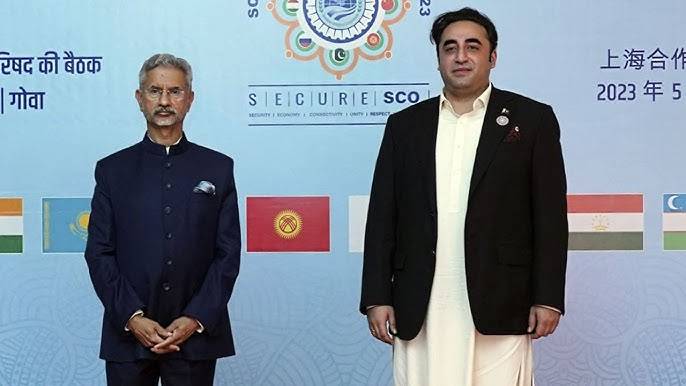Vienna Convention on Diplomatic Relations, 1961 states ;
“The person of a diplomatic agent shall be inviolable. He shall not be liable to any form of arrest or detention. The receiving State shall treat him with due respect and shall take all appropriate steps to prevent any attack on his person, freedom or dignity.”
Good or at-least workable relations between states, especially neighbouring states is an important aspect of foreign policies of states all the world. Unfortunately, since independence (August 1947) of both Pakistan and India it has been a burning issue. Both sovereign states lack trust on each other and have also entered into two wars in last 75 years, other than skirmishes. Opportunities do come and provide the deck board to move on if not jump. SCO meeting at Goa was an opportunity to sit together and speak on burning issues. Regardless the outcome of stated agenda of the meeting, the *handing of a visiting Foreign Minister of a sovereign neighbouring counties by a trumpeted largest democracy of the world didn’t would well.
Avoiding a hand shake, or displaying a negative body language, or calling a visiting dignitary as spokesman of terrorism, by a foreign minister with stature of Subrahmanyam Jaishankar showed much short of a civilised state.
Historically, Diplomatic Protocol involves etiquette on a local and international scale, and the practice of good manners on a daily basis. It evolved as a result of old traditions, when in the early days of civilization hospitality was extended to an arriving guest.
Diplomatic protocol determines the official and social rules in official diplomatic relations, defining a special etiquette within diplomacy and serving as objective guidance in diplomatic interaction between different actors in diplomacy.
“Courtesy, Respect and Professionalism are most important components of a diplomatic protocol” - Tomasz Orłowski Tip: See your country's diplomatic protocol written by your Ministry of Foreign Affairs. It will help you to get into a role of a diplomat.
As per former UK Ambassador Charles Crawford highlighting the sensitive relationship between the Hosts and Guests: “Over the centuries, it became accepted that rulers would host permanent foreign legations to make the conduct of international business easier. In either case (visiting or permanent ‘ambassadors’) courtly rules evolved based on two simple and largely universal norms of human hospitality. Hosts have responsibilities towards guests. Guests have responsibilities towards hosts.”
Bilawal Bhutto-Zardari's visit to India is the first by a Pakistani foreign minister in 12 years and has garnered a lot of media attention in both countries. Internally it created a stir too, as some segments were not in favour of visiting our foreign minister India after its annulling Special Status of Indian occupied Kashmir in 2019.
The Pakistani foreign minister said that, despite his rare visit to India, there was no change in the status of diplomatic relations. Responding to Bilawal Bhutto-Zardari, India's Jaishankar said the article of the Indian constitution that had given special status to Jammu and Kashmir "is history" and the "sooner people realise it, the better".
He also described Pakistan's position on Kashmir as effectively backing terrorism. "Victims of terrorism do not sit together with perpetrators of terrorism to discuss terrorism," Jaishankar told reporters.
"Victims of terrorism defend themselves, counter acts of terrorism, they call it out, they delegitimise it, and that is exactly what is happening," he said.
Contrarily, what Bhutto had stated was not out of context. He had reiterated that Issue of J&K was to be solved as per UN resolutions. By no means it was offensive or against the international norms!
At internal front, it was healthy to note opposition parties in Pakistan voicing against treatment meted out to a visiting Foreign Minister, and condemning statements of Indian foreign minister, presenting a United front on an international issue despite their strict differences on political issues.
Whether the visit to India under prevailing circumstances was justified or not, is another debate, which is not in the purview of this article. The issue is failure of India to uphold Diplomatic Protocols and giving a precedent to other countries follow that. Even if it was a deliberate attempt to settle some old score, still was a bad move by them!






